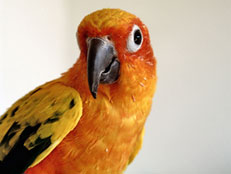
Wild conures feast on nuts, berries, grass nuts, grains, and even insects. However, since domesticated conures are more sedentary, their diet has to be strictly monitored.
Do try to limit the amount of seed. While there was a time when seed was thought to be the best way of feeding a bird, experts now know that the vitamins and minerals in most natural seeds aren’t enough to meet the conures’ nutritional needs.
Your best bet is a fortified pellet diet, with a small amount of seeds and fruits introduced each day. These can provide phytonutrients, which boost the immune system and are not typically found in pellets. Birds will also appreciate the variety—even you wouldn’t like eating the same kind of cereal for your whole life.
If you are giving a full seed diet, then you will have to ask your veterinarian to recommend some vitamin or calcium supplements. Again, you will need to introduce fruits and vegetables. Conures generally like apples (take out the seeds, which are poisonous!), grapes, corn on the cob, peas, sweet potatoes, poppy, dandelions, and carrots. They also like green, leafy vegetables like lettuce and cabbage. Don’t give avocado, though, since it can be harmful to birds.
Since conures do eat meat, some owners even give them a small amount of dog food or mealworms. You can give cottage cheese or hard boiled eggs as a way of increasing their protein intake. Millet spray is a good treat, while a cuttlebone is recommended as a mineral supplement.
You should also supply gravel. Birds don’t have teeth, so they swallow seeds whole. They eat gravel, which helps break down the husks in their stomach.
conures Food -Treats
Treats are an excellent way of rewarding your pet for a successful trick. However, limit the intake. Not only will your bird grow fat, but the “novelty” factor wears off and the treat no longer motivates it to learn something new.
Different birds have different favorites, so find out what your conure loves and offer it exclusively during training sessions. Break the treat into smaller, bite-sized pieces. This prevents over feeding and also makes it easier to chew, so the bird doesn’t get distracted when it eats.
You should give the treat right after it completes a trick, so your conure immediately makes a connection between an action and a reward. Waiting too long, or giving the treat just to appease it, will only be confusing.